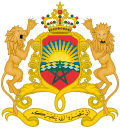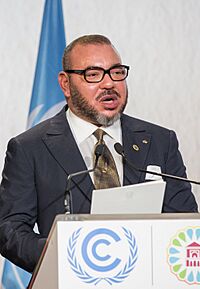King of Morocco facts for kids
Quick facts for kids King of Morocco |
|
|---|---|
| ملك المغرب (Arabic) | |

|
|
| Incumbent | |
 |
|
| Mohammed VI since 23 July 1999 |
|
| Details | |
| Style | His Majesty |
| Heir apparent | Crown Prince Moulay Hassan |
| First monarch | Al-Rashid ibn Sharif |
| Formation | 1631 (Alawi dynasty) |
| Residence | Dar al-Makhzen, Rabat |
The King of Morocco is the country's leader and head of state. This means the king is the most important person in Morocco. The kings of Morocco belong to a special family called the Alawi dynasty. This family has ruled Morocco for a very long time.
The current King of Morocco is Mohammed VI. He became king on July 23, 1999. This was after his father, King Hassan II, passed away.
Contents
How a King is Chosen
The rules for choosing the next king are in Morocco's Constitution. Usually, the oldest son of the king becomes the next ruler. This is called agnatic primogeniture. If the king has no sons, or if he chooses a younger son, the crown can pass to the closest male relative in the family.
What the King Does
In 2011, Morocco changed its Constitution. This happened after many people protested, asking for more political freedom. These protests were part of a bigger movement called the Arab Spring. In response, the king created a group to write a new constitution.
This new constitution made Morocco a constitutional monarchy. This means the king shares power and must follow the rules in the constitution. He is not the only one who makes all the decisions. However, the king still has a lot of power. He has the final say on big plans and projects for the country.
The King's Role in Government
The king is the head of state. He is a symbol of Morocco's unity. He also represents Morocco when dealing with other countries. The king is in charge of the country's army and the courts. He also handles matters about religion and foreign policy. The king can choose and remove the prime minister. The prime minister usually comes from the biggest political party in parliament.
The King's Religious Role
Since 1962, the king has also been called Amir al-Mu'minin. This means 'Commander of the Faithful'. This title gives him religious authority. It shows that the king's power is also based on his religious importance. This idea was already very important in Morocco before it was put into the Constitution.
Past Kings
Learn More
- Politics of Morocco
- 2011–2012 Moroccan protests
- History of Morocco
See also
 In Spanish: Rey de Marruecos para niños
In Spanish: Rey de Marruecos para niños
 | Kyle Baker |
 | Joseph Yoakum |
 | Laura Wheeler Waring |
 | Henry Ossawa Tanner |

